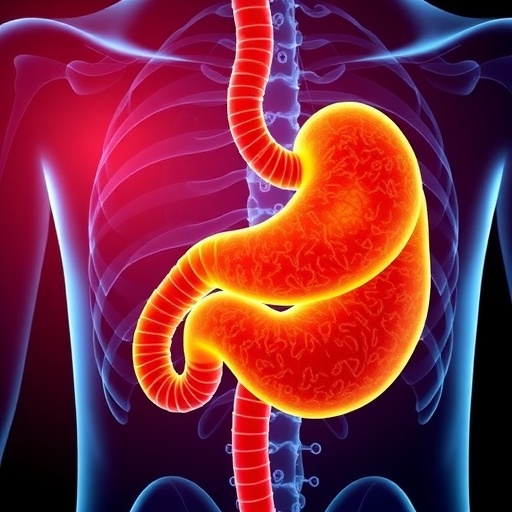In a groundbreaking advancement poised to reshape the therapeutic landscape of advanced gastric cancer, researchers have unveiled compelling evidence supporting the first-line use of anlotinib combined with toripalimab in patients burdened with this formidable malignancy and a compromised performance status. The phase II APICAL-GC trial, a beacon of hope in this challenging clinical setting, delivers promising data that could redefine treatment paradigms for individuals previously deemed unsuitable for aggressive interventions due to their diminished functional capacity.
Gastric cancer remains one of the deadliest cancers worldwide, often diagnosed at advanced stages with limited curative options. Patients presenting with a performance status of 2—a clinical measure indicating significant debilitation—represent a particularly vulnerable cohort. Traditionally, their impaired health has constrained treatment choices, excluding them from intensive chemotherapy regimens that may exacerbate their frailty. Consequently, there has been a compelling need to explore regimens that can balance efficacy with tolerability in this delicate patient population.
The APICAL-GC trial harnesses the synergistic potential of anlotinib, an oral multi-targeted tyrosine kinase inhibitor known to impede tumor angiogenesis and proliferation, with toripalimab, a programmed cell death-1 (PD-1) immune checkpoint inhibitor designed to unleash the host’s anti-tumor immunity. By integrating these two modalities, the trial aims to exploit concurrent anti-angiogenic and immunomodulatory mechanisms. This dual-pronged approach could break the tumor’s protective microenvironment, facilitating a robust immune response against cancer cells.
Liu and colleagues executed the APICAL-GC trial meticulously, enrolling advanced gastric cancer patients characterized by performance status 2, who are seldom represented in clinical trials due to their fragile condition. Over the course of the study, the investigational combination demonstrated not only a manageable safety profile but also significant clinical activity, invoking meaningful response rates and survival benefits that surpass existing standards of care in this subgroup.
Central to the therapeutic success observed is anlotinib’s ability to inhibit vascular endothelial growth factor receptors (VEGFR), fibroblast growth factor receptors (FGFR), and platelet-derived growth factor receptors (PDGFR), effectively stalling angiogenic signaling pathways pivotal for tumor nourishment and expansion. Coupled with toripalimab’s immune checkpoint blockade—which alleviates T-cell exhaustion—the combination fosters a hostile milieu for tumor cells that shifts the balance towards tumor regression.
The trial’s methodology incorporated rigorous baseline assessments, along with serial radiographic and biomarker evaluations, to parse out response dynamics and mechanisms underlying treatment efficacy. Notably, the intertwined pharmacodynamics of angiogenesis inhibition and immune activation appear to recalibrate the tumor microenvironment, increasing T-cell infiltration and reducing immunosuppressive elements such as regulatory T cells and myeloid-derived suppressor cells.
Importantly, despite the vulnerable patient cohort, the APICAL-GC trial reported manageable adverse effects. Common toxicities aligned with those expected from both agents, including hypertension, proteinuria, fatigue, and immune-related adverse events, yet they seldom necessitated treatment discontinuation. This tolerability is particularly encouraging for performance status 2 patients, where treatment-related morbidity often compels early cessation of therapy.
The findings have far-reaching implications beyond gastric cancer, signaling a potential paradigm shift in oncologic treatment where combination strategies transcend monotherapies’ limitations by leveraging complementary mechanisms. The trial underscores the importance of broadening eligibility criteria in clinical studies to include patients with poorer functional status, thus generating evidence to guide treatment in real-world settings.
The mechanistic rationale behind this combination extends to tumor immunoediting concepts—the process by which tumors evade immune surveillance. Anlotinib’s normalization of aberrant vasculature may enhance immune cell trafficking, thereby potentiating toripalimab’s checkpoint inhibition by increasing effector T-cell access to tumor niches previously barricaded by hypoxia and abnormal vessels.
Furthermore, emerging biomarker analyses from APICAL-GC hint at predictive signatures that could refine patient selection. Factors such as PD-L1 expression, tumor mutational burden, and angiogenic gene signatures might stratify responders, enabling a precision medicine framework to optimize benefit-risk profiles.
Given gastric cancer’s heterogeneity, future investigations could explore combining anlotinib and toripalimab with additional agents, such as chemotherapy or targeted therapies, to further amplify efficacy. However, the current trial’s design focusing on a monotherapy-sparing approach is pivotal, reducing the toxicity burden that traditionally limits treatment tolerability in frail patients.
From an immunological perspective, toripalimab reinvigorates exhausted cytotoxic T cells by disrupting PD-1/PD-L1 interactions, a well-established axis leading to immune evasion in multiple cancers. By reactivating these effectors, it induces durable tumor cell killing and immunological memory formation, which may underpin sustained clinical responses observed.
The APICAL-GC trial’s success also underscores advances in drug development optimizing oral therapies, affording ease of administration and improved quality of life—key considerations for patients with diminished performance status. The oral availability of anlotinib simplifies treatment logistics, contrasting with intravenous agents requiring frequent hospital visits.
Moreover, this study exemplifies the benefits of integrating multidisciplinary management, encompassing oncology, immunology, molecular biology, and pharmacology, to dissect complex disease dynamics and therapeutic impacts accurately. Such comprehensive approaches underpin the translational science that bridges bench discoveries with bedside applications.
Looking forward, the researchers advocate for larger randomized phase III trials to validate these findings and explore long-term outcomes, including overall survival and quality of life metrics. Additionally, post-marketing surveillance will be vital to monitor rare adverse effects and real-world effectiveness across diverse populations.
In summary, the APICAL-GC phase II trial heralds a new horizon in treating advanced gastric cancer patients with performance status 2 by deftly combining anti-angiogenesis and immunotherapy. This combination therapy not only extends hope to a historically underserved patient group but also reinforces the paradigm that multifaceted targeting of the tumor and its microenvironment may overcome intrinsic resistance mechanisms, paving the way for enduring clinical benefits and improved patient outcomes.
Subject of Research: Advanced gastric cancer treatment, first-line therapy in patients with performance status 2
Article Title: Anlotinib plus toripalimab as a first-line treatment in patients with advanced gastric cancer and performance status 2: the phase II APICAL-GC trial
Article References:
Liu, K., Qin, BD., Chen, SQ. et al. Anlotinib plus toripalimab as a first-line treatment in patients with advanced gastric cancer and performance status 2: the phase II APICAL-GC trial. Nat Commun 16, 5069 (2025). https://doi.org/10.1038/s41467-025-60317-z
Image Credits: AI Generated




